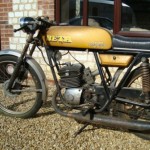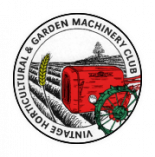Forum Replies Created
-
AuthorPosts
-
June 20, 2016 at 10:14 pm #21220
 stuartParticipant
stuartParticipantIts diesel powered whatever it is.
June 19, 2016 at 11:57 am #21214 stuartParticipant
stuartParticipantAuctions are your best bet.
June 19, 2016 at 10:26 am #21212 stuartParticipant
stuartParticipantI believe its a Landmaster “Kestrel” dating from the mid 1950,s.The engine is a 4-stroke Villiers MK25.
June 16, 2016 at 6:53 pm #21202 stuartParticipant
stuartParticipantIs it the Villiers MK25C 2 stroke engine ?.If so check and set the needle in the brass throttle slide 2 and 3/8″ of an inch out (theres a small screw at the top and in the centre of the brass throttle slide for this purpose).Also drain any residue fuel/oil mixture from the crankcase as if there,s too much in there starting will be a problem.There is a drain screw on each crankcase half for this purpose.I suggest you use the front one but access is a bit of a git so first engage the “clutch” which will raise the engine slightly.Be careful not to cross thread it when putting it back in.
June 4, 2016 at 10:24 pm #21065 stuartParticipant
stuartParticipantThe nut may be LH thread ???
Get some heat on the red clutch part and with a decent 3 legged puller it should come of the shaft.Also use diesel (not WD40 as it just vapourizes with the heat) as a penetrating oil to help it of.May 26, 2016 at 10:04 pm #20979 stuartParticipant
stuartParticipantIf the engine takes a little while to slow down after being revved (and its not just the large / heavy flywheel effect) it points to a lean mixture caused by an air leak.Check cylinder head gasket(s) and carburettor inlet manifold gasket(s).Worth checking valve clearances and ignition timing while you are at it too.
Over fueling (rich mixtures) are evident by black exhaust smoke and sooty / black / fouled spark plugs.May 26, 2016 at 7:04 pm #20971 stuartParticipant
stuartParticipantI think you need to clean the carburettor more thoroughly,possibly even get it ultrasonically cleaned.What engine is fitted ??
May 11, 2016 at 9:28 pm #20863 stuartParticipant
stuartParticipantThe SB,s were first issued in January 1961 on a monthly basis.The Gems mentioned are the normal models from the series one to the series five.There are no mention of the earlier models with the V-twin JAP engine fitted (which I presume is what those serial numbers you mention are ?).
May 10, 2016 at 10:20 pm #20858 stuartParticipant
stuartParticipantI have a load of Howard service bulletins that were issued to the dealers.If you need to know anything just let me know as they make for interesting reading.
May 10, 2016 at 9:03 pm #20856 stuartParticipant
stuartParticipantThat’s a great Howard site you have there s1g.Just one small correction though if I may……the Howard 300 and 350 had a 16″ working width as standard (not 18″).This could be extended to 23″ in light soils using the optional blade extensions and a wider rotor shield.
May 9, 2016 at 9:22 pm #20850 stuartParticipant
stuartParticipantI guess the carburation needs some attention.That particular engine should idle beautifully so strip and clean the carburettor and adjust the throttle stop screw (the one with the lock nut in the pic) to obtain a nice “tick-over” speed.It may also need the ignition system looking at too.
May 8, 2016 at 11:58 am #20830 stuartParticipant
stuartParticipantThe correct drive belt for the JAP and Villiers engine models has the Howard part number of 20707 which I think is an A25 belt (but check for yourself before you buy one !).
May 7, 2016 at 10:00 pm #20820 stuartParticipant
stuartParticipantThe engine appears to be a Villiers F15.
May 3, 2016 at 10:30 pm #20791 stuartParticipant
stuartParticipantI had a Howard Bulldog a few years ago and im sure from memory it only had a 4 figure serial number.Yours would be a Bullfinch from the late 1950,s .
May 1, 2016 at 6:34 am #20715 stuartParticipant
stuartParticipantRemove the engine cowling first.Then unscrew the bolt that holds the alloy starting pulley on.Then unscrew the captive bolt that holds the flywheel onto the crankshaft.There are 2 stages to unscrewing this bolt…..first stage just loosens it when you will notice it seems to get tight again.Second stage draws the flywheel of the taper.Note there is no key used on these flywheels or crankshafts.The timing marks are stamped on the flywheel face and alloy armature plate.
-
AuthorPosts
